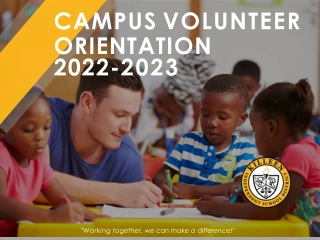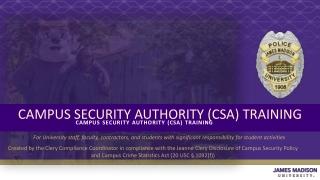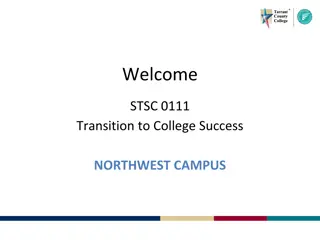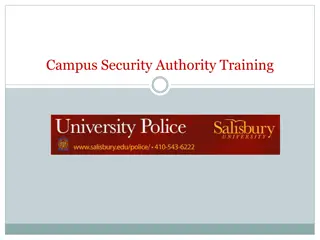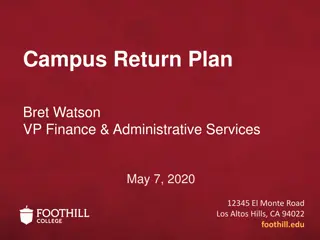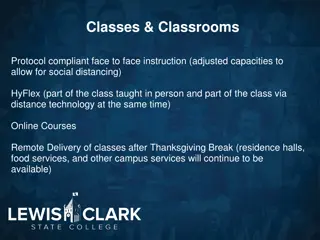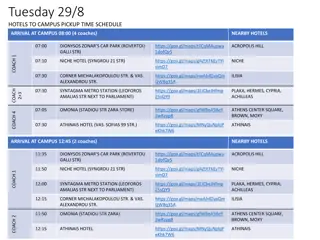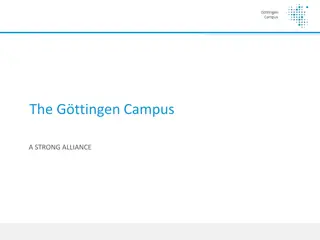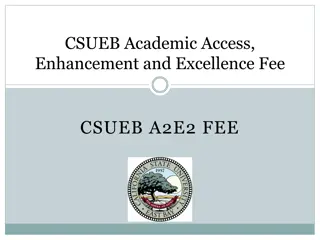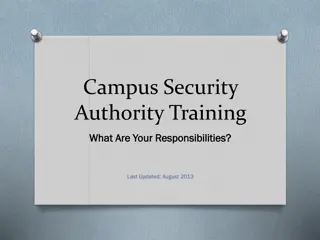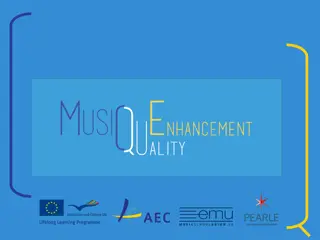Recommendations for Positive Campus Culture Enhancement
Prioritize restorative practices, affinity spaces, virtual community building, and white accountability to foster trust, inclusivity, and connection among students and staff on campus.
Download Presentation

Please find below an Image/Link to download the presentation.
The content on the website is provided AS IS for your information and personal use only. It may not be sold, licensed, or shared on other websites without obtaining consent from the author.If you encounter any issues during the download, it is possible that the publisher has removed the file from their server.
You are allowed to download the files provided on this website for personal or commercial use, subject to the condition that they are used lawfully. All files are the property of their respective owners.
The content on the website is provided AS IS for your information and personal use only. It may not be sold, licensed, or shared on other websites without obtaining consent from the author.
E N D
Presentation Transcript
se Power Consults Student Services Program Council
Questions: How does SSPC fit into these 19 short & long term recommendations? Which ones should we take the lead on or collaborate?
Recommendation #1: Restorative Practice Short Term: Prioritize repairing trust with classified staff, students, and faculty. Train an employee to facilitate conversations centered on restorative practices and restorative justice on campus to rebuild trust between employees and administrators. Dedicate time to investing in rebuilding or sustaining trust and transparency with faculty, classified staff, and students through frequent listening sessions, surveys, check-ins with groups that support marginalized students and employees on campus. Student Services collaborate Action: have regular check-in meetings Questions to reflect on: Establish trust Create a system that addresses concerns Create an ombudsman employee can go to that person
Recommendation #2: Affinity Spaces Short Term: Prioritize affinity spaces for historically marginalized groups on campus. Provide opportunities for individuals currently leading affinity spaces on campus to receive additional training facilitating anti-racist and anti-bias conversations. Prioritize creating affinity spaces for Black/African Americans, the Latino/a/x community, the LGBTQIA+ community, Veterans, People with Disabilities, New Migrants, and Dreamers. These groups were mentioned repeatedly throughout assessments as needing spaces to practice physical and psychological safety while learning how to navigate the College's systems. Student Services lead Action: develop & shape this recommendation.
Recommendation #3: Virtual and Covid-19 safe in-person community building Short Term: Fostering communal spaces for employee and student connection is vital to growing a positive campus culture. Invest in regular zoom community-building events centered on keeping Ca ada College stakeholders connected during the pandemic. Solicit feedback from the Associated Students of Ca ada College (ASCC), Classified Senate, and the Academic Senate on ways the College can support campus-community connection in person. Student Services collaborate
Recommendation #4: White Accountability Short Term: Prioritize investment in sustained training for disrupting dominant group cultural practices on campus. Invest in the development of White Accountability Cohorts. Develop dedicated spaces that help white identified employees learn how to practice individual and collective accountability in dismantling white supremacy systems and practices. Student Services collaborate Questions to reflect on: How do we tie this to Student Services? How do we make training mandatory?
Recommendation #5: Racial/Cultural Bias Incident Accountability Short Term: Prioritize investment in sustained training for disrupting dominant group cultural practices on campus. Invest in the development of White Accountability Cohorts. Develop dedicated spaces that help white identified employees learn how to practice individual and collective accountability in dismantling white supremacy systems and practices. Student Services Lead Action: develop peer advocates and staff advocates Questions to reflect on: How do we tie this to Student Services? How do we make training mandatory?
Recommendation #6: Equity Scheduling Short Term: Collaborate with the Classified Senate, Academic Senate, and the ASCC to develop a more equitable approach to scheduling meetings, training, and events on campus. Student Services collaborate
Recommendation #7: Champion Equitable Work Commitments Short Term: Commit to disrupting the normalization of unpaid work and overtime specifically for part-time employees. Explore how the administration and employees can align on a strategy for developing a more equitable workload, specifically for classified staff. Consider offering flexible work schedules and encourage flexible deadlines for departments impacted by staff shortages Student Services Collaborate
Recommendation #8: Communication Short Term: Dedicate resources and time to simplifying and streamlining information to effectively relay Covid-19 updates, DEI integrations, and other campus-related opportunities and resources. Incorporate employee and staff suggestions for achieving better communication and develop a communication plan that outlines the specific methods the College will utilize to improve communication. Invest in peer-to-peer communication technologies as an additional tool to communicate shifting college updates. Student Services Lead Action: Integrate COVID-19 updates to on-boarding process Questions to reflect on: Is it accessible? Is it clear?
Recommendation #9: Financial Aid & Student Services Short Term: Identify opportunities for collaboration with Financial Aid and Student Services. Schedule frequent strategizing sessions with employees and student leadership connected to student services. Determine the best strategy for correcting ineffective methods for helping students and employees access resources on campus. Consider the following actions: (1) examine the efficacy of access points on the College's website; troubleshoot office hours availability as it relates to registration, (2) invest in a marketing campaign that communicates a clear path to services for individuals in need of social service support such as housing security resources and immigration support, (3) invest in building relationships with community programs and organizations committed to providing resources to historically marginalized groups, leverage resources of these groups to compensate for services the College does not currently have the infrastructure to support, (4) provide employees with introductory trainings on integrating asset-based language, that prioritizes the strengths of historically marginalized groups. Student Services lead
Recommendation #10: Centralize Anti- Racism and Cultural Equity Task Forces Short Term: Collaborate with various anti-racism task forces, affinity groups, and programs that provide services for historically marginalized groups across the San Mateo County Community College system. Explore opportunities for cross collaboration on achieving anti-racism task force and ACES committee goals. Student Services collaborate
Recommendation #11: Early Access Opportunities Short Term: Develop a plan to investigate potential inequities within early access programs. Create a student and employee advisory committee dedicated to addressing identified issues and creating policies and protocols that redress power imbalances. Student Services lead Actions: Develop meaningful connections Develop cultural competency and awareness Questions to reflect on: How do we market the program for early access? Are we reproducing racial privilege? How are we ensuring that low-income students have access?
Recommendation #1: Hire a Diversity, Equity and Inclusion Director Long Term: Hire a DEI Director dedicated to training employees and students in anti-racist and culturally competent practices. The role's title can be classified according to the needs present within the College's internal systems. For instance, the role can also be titled, Director of Equity, Diversity, and Belonging. Utilize stakeholder feedback to inform the what type of title and position is needed. Invest in providing the infrastructure the director would need to accomplish DEI goals. Some resources required include but are not limited to (1) a dedicated DEI budget, (2) adequate support staff, (3) dedicated spaces, and (4) clearly outlined support from administrative leadership. Student Services collaborate
Recommendation #2: Re-imagine Participatory Governance: Long Term: Develop a steering committee dedicated to examining the efficacy of the participatory governance system. Continue to gather research on significant issues impacting employees with the participatory governance process. Develop think tanks composed of employees from different classifications to begin brainstorming ideas on making the process more streamlined and accessible. Identify suggestions most supported by employees as tactics to streamline the participatory process and experiment with implementing recommendations through consistent prototyping, testing, and evaluation. Student Services collaborate
Recommendation #4: Champion DEI Funding Campaigns Long Term: Collaborate with the Grants Development and Management Office to design a capital campaign to expand grant- funded programs that support URM programs. Collaborate with programs and committees in need of funding to develop a viable strategy for securing funding from diverse funding streams. Increase funding for departments, centers, and faculty that offer social justice, critical race theory, genderqueer, ethnic, and gender studies classes and workshops. Once funding is secured, work with programs and committees to determine an equitable budget allocation. Student Services collaborate
Recommendation #5: Power redressing Long Term: Dedicate time and resources to identifying and redressing power imbalances across college systems. Publicly claim accountability for any implicit or explicit biased system impacting underrepresented minority groups and communicate the plan to redress that harm. Publicly report goals and progress. Student Services collaborate
Recommendation #6: Bias Reporting Long Term: Implement a campus-wide bias incident reporting system with safeguards for victims and transparent methods for addressing all reports effectively. Ensure that data on incidents are disseminated for analysis, policy improvements, and prevention. Student Services lead
Recommendation #7: Employee Equity Long Term: Develop a plan to draft a policy that pays employees for their intellectual and emotional labor, time, and effort spent on equity, access, diversity, and inclusion work in addition to their positions at the College. Student Services collaborate Action: Create release time for classified staff and students? Compensate for work. Questions to reflect on: Should this be from Classified Senate?
Recommendation #8: Review, Revisit and Reimplement Long Term: Racial and cultural institutional change takes time. Commit to constantly assessing the efficacy of new initiatives, programs, and policies through qualitative and quantitative metrics. If projected goals are not achieved, celebrate the efforts of those who worked towards achieving the goal and include them in assessing what elements need re-imagining. Don't be afraid to re- implement a plan that isn't working; it is more important to revise a DEI integration or strategy instead of completely abandoning it. Student Services collaborate Action: Develop continuous practice on what worked and what needs improvement


